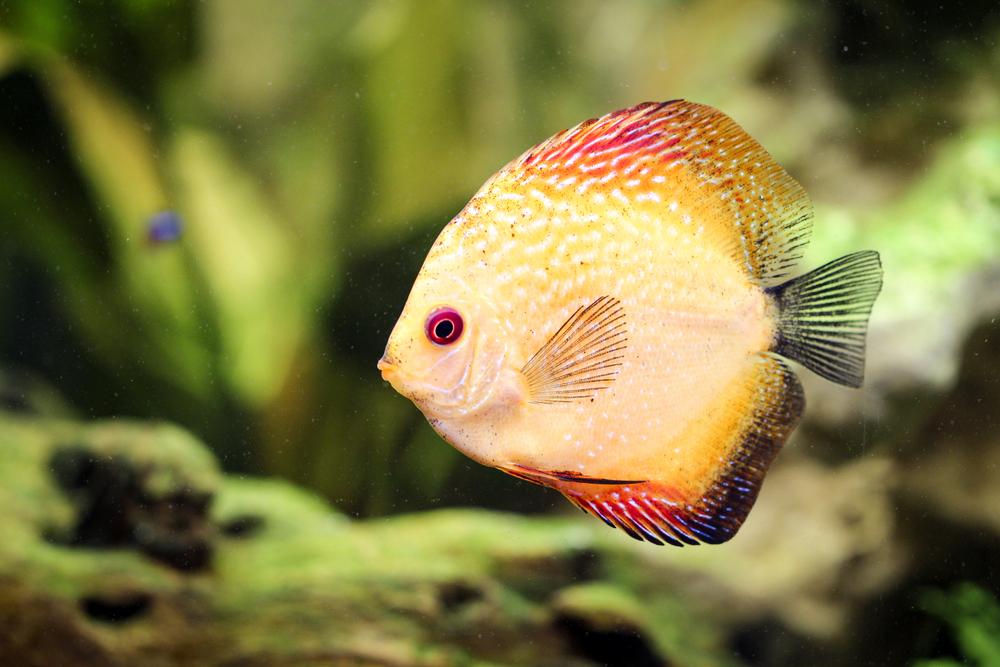As a BetterHelp affiliate, we receive compensation from BetterHelp if you purchase products or services through the links provided
Emotional support animals have gained popularity for their ability to provide companionship and comfort to those struggling with mental health issues. Traditionally, dogs and cats have been the most common choices for emotional support animals. However, there are other options for individuals seeking the therapeutic benefits of a pet without needing the extensive care and training that dogs and cats require. Enter the world of emotional support fish.
Although an unconventional choice for an emotional support animal, fish can deliver numerous mental health benefits. They are low-maintenance, visually calming, and soothing to watch, helping to reduce stress and anxiety levels. As a result, many have started considering fish as a potential option for emotional support animals.
Apart from their calming presence, fish are relatively easy to care for, making them a suitable option for individuals with busier lifestyles or those who may not be able to meet the needs of other emotional support animals. But it’s essential to remember that, like any living creature, keeping and maintaining emotional support for fish comes with its responsibilities, such as ensuring a proper environment and understanding the legal considerations for emotional support animals.
Key Takeaways
- Emotional support fish can provide mental health benefits, such as reducing stress and anxiety.
- They are a low-maintenance option for individuals who may not be able to accommodate the needs of other emotional support animals.
- Care and legal considerations must be considered while choosing and maintaining emotional support fish.
 Understanding Emotional Support Animals
Understanding Emotional Support Animals
Emotional support animals (ESAs) can make a significant difference in the lives of people with emotional or psychological disabilities. These animals provide comfort, companionship, and support, helping individuals cope with their mental health challenges.
The human-animal bond is a powerful connection widely studied by the Human-Animal Bond Research Institute (HABRI) and other organizations. This bond is pivotal in the relationship between humans and their ESAs, as it has been proven beneficial for both mental and physical health.
When it comes to ESAs, there is a range of animal types, but the most common are cats and dogs. However, you might be surprised to learn that pet fish can also serve as emotional support animals, providing a unique form of companionship and therapeutic benefits.
You typically need an emotional support animal letter from a licensed mental health professional to obtain an ESA. This ESA letter confirms that the animal is essential for your well-being, allowing you to have your ESA with you in certain situations like travel or housing.
So, how can pet fish be considered ESAs? Here are some key points to consider:
- Pet fish can provide a calming and peaceful environment, helping to reduce stress and anxiety.
- Watching and caring for fish can offer therapeutic benefits and a sense of accomplishment.
- Fish require relatively low maintenance compared to other pets, making them ideal for individuals with busy lives or limited space.
In conclusion, emotional support animals, including pet fish, can benefit your mental health care strategy. By recognizing the importance of the human-animal bond and obtaining an ESA letter from a mental health professional, you can enjoy the many benefits these unique companions offer.
 Mental Health Benefits of Pets
Mental Health Benefits of Pets
Having a pet, such as an emotional support fish, can be a game-changer regarding mental health. They offer companionship and comfort that can make a huge difference. Your trusty underwater friend provides a sense of well-being and a calming presence, which can be truly beneficial when struggling with anxiety or stress.
Pets help to reduce stress and lower blood pressure, leading to an overall improvement in your mental well-being. For many, they help cope with depression, loneliness, and even more severe mental health conditions like PTSD. Don’t underestimate the therapeutic benefits that an emotional support fish can bring!
- Mood regulation: Pets can significantly impact your mood and provide much-needed relaxation when times get tough.
- Confidence boost: By caring for your pet, you build a sense of purpose and responsibility, increasing your confidence.
- Social support: Pets, like fish, can help reduce feelings of isolation and offer you companionship in a non-judgmental way.
- Calming presence: Having a pet offers a calming presence, helping reduce anxiety and ease you.
Owning a pet can offer numerous benefits to its owner, including a positive impact on an individual’s mental health. The love and support a pet provides can genuinely change a person’s life for the better. Therefore, it is crucial to value the time spent with your emotional support fish and appreciate the incredible mental health benefits it can bring to your life. Although fish may not be as expressive as traditional pets, they can still provide some of the same benefits.
 Emotional Support Fish: An Unconventional Choice
Emotional Support Fish: An Unconventional Choice
Having a pet fish as your emotional support animal (ESA) might not be the first choice that comes to mind. However, there are many reasons why this low-maintenance option could be perfect for your life.
Setting up an aquarium in your living space can quickly bring a sense of calm and serenity. Watching fish gracefully glide through the water can be a soothing and therapeutic experience. Different fish species’ vibrant colors and unique shapes can brighten your mood.
A well-decorated aquarium creates an appealing environment that can be a pleasant distraction from daily stress. The flowing water and gentle movements of the fish can induce a meditative-like state, which helps reduce anxiety and lower blood pressure.
Having a pet fish is less demanding in terms of time than having a dog or cat. Fish are generally considered low-maintenance, making them ideal Emotional Support Animals (ESAs) for individuals with busy lifestyles. They do not require walks or baths; their food is usually affordable and easily accessible.
Here are some benefits of having a pet fish as your emotional support animal:
- Low-maintenance: No need for walks or regular grooming; clean the tank and feed them.
- Reduced stress and anxiety: Watching the fish swim can be calming.
- Vibrant colors: The brightness and variety of fish can elevate your mood.
- Pleasant distraction: A well-maintained fish tank can take your mind off daily worries.
Numerous fish species can make ideal ESAs, with goldfish being popular. However, you can explore alternatives, like bettas or angelfish. You can also consider setting up an outdoor fish pond if you have space.
In conclusion, an emotional support fish might be an unconventional choice, but they offer various mental health benefits while being a low-maintenance pet. Consider creating an aquarium or fish pond in your home to bring some tranquility and comfort.
 Keeping and Caring for Emotional Support Fish
Keeping and Caring for Emotional Support Fish
Now that you’re considering having a pet fish as an emotional support animal knowing how to provide the proper care is essential. Doing so will ensure your fish thrives and bring you all the calming benefits of a well-kept aquarium.
Setting Up a Comfortable Home
Before bringing your fish home, preparing their living space is crucial. Aquariums come in various sizes and styles, so choose one that fits your space and preference. Ensure the aquarium is large enough to house your fish, considering the species’ needs comfortably. A decent filter and an appropriate heater for tropical fish are essential, as well as decorations and places for your fish to hide.
Feeding Your Fish
Feeding is an essential aspect of fish care. Make sure to research the dietary needs of your chosen species, as different fish have specific requirements. Many pet stores offer a variety of fish foods, and it’s essential to select one that caters to your fish’s nutritional needs. Avoid overfeeding, as excess food can harm your fish and water quality.
Establishing a Routine
To enjoy the calming benefits of your fish, setting up a daily routine will help. Set aside time each day to watch your fish, providing a moment of relaxation while keeping an eye on their well-being. Regular observations allow you to spot any potential issues early, addressing them before they become problematic.
Maintaining a Clean Environment
Set up a routine to keep your aquarium clean and looking its best. Regular water changes are crucial, typically around 10 to 20% of the tank volume per week, depending on the size and fish species you’re keeping. Don’t forget to clean the filter and check the water parameters, ensuring everything is within the recommended range.
Grooming is Optional
When it comes to fish, grooming isn’t a typical requirement. However, you might need to trim plants and remove algae from the tank’s surfaces. This helps maintain a clean and attractive environment for your fish.
As you venture into the world of emotional support fish, taking care of these vital aspects will contribute to a thriving, stress-reducing hobby. Embrace the calming nature of this unique pet and enjoy the serenity that comes with a well-maintained aquarium.
Legal Considerations for Emotional Support Fish
When considering an emotional support fish to help you cope with emotional or mental challenges, you must familiarize yourself with the legal aspects that govern emotional support animals (ESAs). By understanding the legal landscape surrounding ESAs, especially in terms of housing, you can make confident decisions concerning your fish.
As an Emotional Support Animal (ESA) holder, the Fair Housing Act (FHA) is an important law to be aware of. The FHA prohibits discrimination in housing based on disability. This act protects individuals with disabilities and allows them to have their ESAs, including emotional support fish, in their residences.
Under the fair housing rules, landlords are expected to make reasonable accommodations for ESAs. These accommodations may include waiving pet restrictions or fees typically applicable to ordinary pets. To qualify for these exemptions, you must be prepared to provide documentation proving your need for an ESA, such as a letter from a licensed mental health professional. Also, remember that the fish must not directly threaten property or other residents.
However, ESA owners should consider some critical limitations within the regulations. First, the fish tank or aquarium required for your fish must adhere to the building or landlord’s specific size and weight restrictions. Second, ESAs might not be permitted in certain housing types, such as buildings with less than four units or owner-occupied buildings. Always check with your landlord and review the fair housing rules to ensure compliance.
Here are some key takeaways:
- Familiarize yourself with the Fair Housing Act (FHA) to understand how it protects individuals with ESAs.
- Ensure you have proper documentation demonstrating your need for an emotional support fish.
- Check with your landlord regarding fair housing rules and weight or size limits for your fish tank or aquarium.
- Remember that certain residences may have additional restrictions, so always double-check before moving in.
By staying informed about the legal aspects of emotional support fish and understanding your rights, you can create a comfortable and accommodating living situation for you and your supportive companion.
 Other Emotional Support Animals
Other Emotional Support Animals
Besides fish, many other types of emotional support animals (ESAs) can provide comfort and alleviate symptoms for people with emotional or psychological disabilities. Let’s look at some of the popular ESAs that help improve emotional well-being.
Dogs and Cats: These furry friends are the most common ESAs. They’re adorable and offer immense emotional comfort to their owners. Emotional support dogs are known for their loyalty, affection, and sensitivity to human emotions. Conversely, cats may not be as interactive as dogs but are great at providing a calming presence. Remember that an emotional support cat should have a calm and gentle temperament to suit your needs.
Birds: Emotional support birds can be an excellent choice if you’re looking for a quieter and low-maintenance ESA. Birds like parrots, canaries, and cockatiels are known for their social nature, intelligence, and the joy they bring to their owners. Remember to choose a bird species that matches your lifestyle and needs well.
Rabbits: These fluffy animals make fantastic ESAs due to their gentle nature and ability to form strong bonds with their owners. Rabbits are quiet, low-maintenance, and can be house-trained easily, making them an ideal ESA for people with limited space or those who live in apartments.
Rodents: Don’t underestimate the potential of small animals like guinea pigs, hamsters, and rats to serve as emotional support animals. They’re low-maintenance, easy to care for, and can provide companionship and comfort.
Reptiles: If you’re more interested in non-traditional emotional support animals, reptiles might be the right choice. Some reptiles, such as bearded dragons or geckos, can make great ESAs due to their low-maintenance nature and ability to interact at a comfortable distance. Just be sure to research and understand their specific care requirements.
In conclusion, emotional support animals come in various shapes and sizes, so you can find the perfect companion to suit your needs and preferences. Many options exist beyond fish, including dogs, cats, birds, rabbits, rodents, and reptiles. Ultimately, you should choose an ESA that best aligns with your lifestyle and emotional needs to help improve your overall well-being.
Frequently Asked Questions
What are the benefits of having an emotional support fish?
Having an emotional support fish can improve your mental well-being by providing companionship and alleviating feelings of loneliness and depression. Watching their graceful movements and vivid colors can be a calming and soothing experience. Some key benefits include:
- Improved mood and reduced depressive symptoms
- Lowered stress and anxiety levels
- A sense of companionship and connection
- Greater focus and concentration
How can a fish help ease anxiety and stress?
Research has shown that watching fish swim can lead to relaxation, lowered blood pressure, and reduced stress within as little as 10 minutes. Their peaceful movements and vibrant colors provide visual stimulation that can help to distract you from anxious thoughts, making them an ideal companion for those seeking stress relief.
Are fish recognized as emotional support animals?
Yes, fish can be recognized as emotional support animals. While they might not provide physical comfort like traditional pets, emotional support fish can still offer therapeutic benefits to improve your mental health and well-being.
What type of fish is best for providing emotional support?
A variety of fish can serve as effective emotional support animals. Some popular choices include Goldfish, Angelfish, Betta, Rainbowfish, Guppies, and Mollies. Each type has unique characteristics, so selecting a species that resonates with your preferences and needs is essential.
How to care for an emotional support fish?
Caring for an emotional support fish involves providing them with:
- A suitable aquarium with appropriate size, decorations, and hiding spots
- The correct water parameters, temperature, and filtration system
- A balanced diet and proper feeding habits
- Regular maintenance with cleaning, water changes, and monitoring of water quality
- Monitoring your fish’s health and quickly addressing any concerns
What are the legal aspects of having an emotional support fish?
Laws surrounding emotional support animals sometimes apply mainly to animals like dogs and cats; however, as long as your emotional support fish brings therapeutic benefits to your life, they can be recognized as emotional support animals. Familiarizing yourself with local laws and any restrictions, such as housing or travel limitations, is essential.
- 3 Ways Wearing a Hat Can Help Lower Your Stress Levels - April 19, 2025
- Breaking the Silence: Why Men’s Mental Health Matters More Than Ever - April 15, 2025
- How to Transform a Home’s Patio Space into a Relaxing Space - March 23, 2025
This site contains affiliate links to products. We will receive a commission for purchases made through these links.


 Understanding Emotional Support Animals
Understanding Emotional Support Animals Mental Health Benefits of Pets
Mental Health Benefits of Pets Emotional Support Fish: An Unconventional Choice
Emotional Support Fish: An Unconventional Choice Keeping and Caring for Emotional Support Fish
Keeping and Caring for Emotional Support Fish Other Emotional Support Animals
Other Emotional Support Animals
